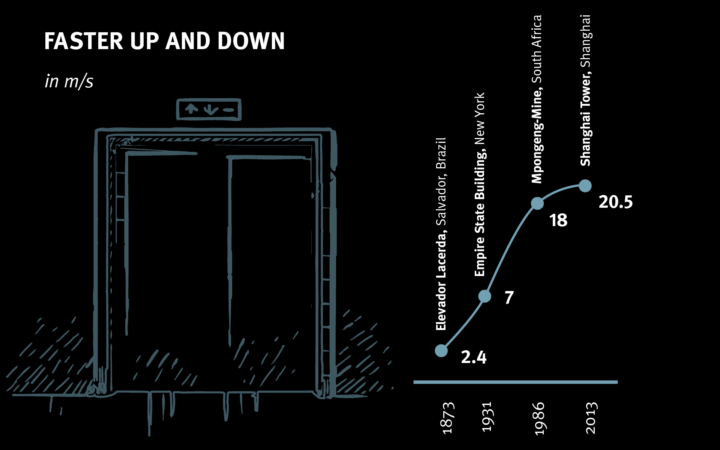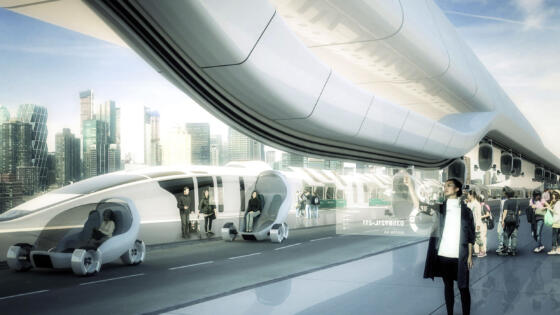
Stop!
“Time is what you read on a clock.” The quote is attributed to Albert Einstein – and it would be great if things were that easy. Time always seems to fly and flee, to press and push, to slip through our fingers or to be consumed and stolen. Time can’t be stopped, gained, saved or, let alone, be defeated. And although the likes of Shakespeare, Goethe, Marx or Proust were concerned even in their day about the rapid acceleration of life’s pace the feeling of constantly being rushed and unable to do anything about it is a key characteristic of our modern accelerated society. Taking one step at a time? That, if at all, is a thing of the past.

Although we live longer, time’s in short supply
Now it’s not that people today have fewer hours at their disposal than they did in the days of Shakespeare. Quite the opposite is true! Aside from the fact that, as scientists found out, a day on Earth has become a millisecond longer in the past century, we also live longer and work less. The average life expectancy in Germany, for instance, has doubled in the past 130 years – and about 100 years ago, people here used to work 57 hours per week on average. Today, it’s 35.

Travel times have been shortened as well: “Since the days of the industrial revolution the world seems to have shrunk to about a sixtieth of its original size,” writes the sociologist Hartmut Rosa. While in the 18th century it took a whole month to get from London to New York, today an airliner will take us there in about eight hours. Trains, let alone automobiles, travel faster than they used to as well. On the other hand, cars in Berlin move at an average speed of about 24 kilometers (15 miles) per hour. That used to be the speed of stage coaches at the beginning of the 19th century, so maybe the best way to go is for us humans to get a move on. Apparently, that’s exactly what we’re doing because the walking pace of pedestrians in industrial countries has actually increased by ten percent within just a single decade.

Ultimately, almost all technological advances – be it elevators or digitization – served to save time and so would have had to provide us with more of it. But nothing could be further from the truth! Instead of enjoying the time we’ve gained at our leisure we’re constantly under time pressure. For lunch we rush to the nearest fast food restaurant and wolf down a quick meal. We swipe potential matches on Tinder at one-second intervals, have friends on Speed Dial and grab a coffee-to-go to fight fatigue.

Frenetic standstill
The problem is that modern man and woman fail to recognize time as something that oozes away, as a scarce resource to be fully exploited while it’s available and that it’s best to avoid wasting it on meaningless things. However, our perception of time is a tricky thing. When we have fun the minutes seem to fly but when we’re dealing with adversity they seem to stop. Conversely, we have long and wide memories of things that made us happy – but only fleeting ones of those that didn’t. This phenomenon is called “subjective time paradox” in which the time we experience and the time we remember are, in a manner of speaking, inversely proportional.
And heaven knows what happens to time while we surf the worldwide web for hours on end or watch a series of television shows. Quite fittingly, the recently deceased French philosopher and theoretician of speed, Paul Virilio, coined the term “frenetic standstill” as long as a quarter of a century ago: a condition in which we stand by idly while the pace keeps accelerating and we feel as if the years are passing us by in fast forward mode. We sit or stand around, staring at phones, hastily tapping messages into keypads and watching breaking news and live video footage from around the world. Admittedly, all this can create a bit of confusion as far as the perception and organization of space and time goes.

Constantly up to speed
So, what are we doing about it? We step on the gas. “Acceleration becomes a substitute for eternity,” says Hartmut Rosa and what he means by this is that under time pressure – you’ve only got one life – we compulsively try to make use of every possible opportunity faster and faster while slowly but surely exhausting ourselves in the process. The official term for this is “fear of missing out” or its acronym “FOMO.” It refers to the modern-day concern of missing out on something crucial in life and of no longer being up to speed. Unsurprisingly, that’s the fault of modern technologies such as cell phones and social networks – and relief is not in sight: for one because they incessantly generate new options and for the other because we’re hardly able to enjoy the present anymore. Instead of just sitting on a beach and counting the waves we take pictures and provide them as fodder to insatiable Instagram or Facebook feeds.

Now of course we could from time to time read a self-help book on how to decelerate or just throw our phones out the window. However, there’s another option that seems to make more sense to me: We could try to appreciate the hours again in which simply nothing happens, when boredom prevails and the moment appears to stretch into infinity. We shouldn’t make the mistake of dismissing boredom as a senseless waste of time. Even Goethe in his day thought highly of idle moments: “If monkeys managed to develop a feeling of boredom they might become humans.” On that note: allow yourself to be human all the way.


